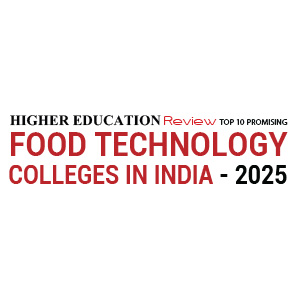D Y Patil (Deemed To Be University), Navi Mumbai: A Hub Of Innovation In Biotechnology, Bioinformatics & Food Technology
By Dr. Debjani Dasgupta, Director
By merging education with industry exposure, biotechnology and food technology institutions foster growth, while equipping students with scientific expertise, promoting innovation, and supporting entrepreneurship through research labs and incubation centers. In light of this, institutions like D.Y. Patil University nurture future leaders, drive advancements, and create employment opportunities in these dynamic fields.
Dr Dnyandeo Yashwantrao Patil, a renowned philanthropist and Padmashree awardee, envisioned making quality education accessible to India’s growing youth and thus founded the D. Y. Patil Deemed to be University, Navi Mumbai, in 2002. The University stands tall as a beacon of excellence in higher education today, providing an extensive range of programmes designed to cater to diverse academic and professional interests. Recognizing the transformative potential of biological sciences, the University took a prescient step in 2003 by establishing the School of Biotechnology and Bioinformatics.
The School of Biotechnology and Bioinformatics has since been recognized as one of the pioneering institutes in Maharashtra to offer cutting-edge programmes in Biotechnology and Bioinformatics. Having consistently chosen to focus on transformative fields by offering innovative, futuristic programmes, the School initiated Food Science and Technology programmes in 2013. Food science and technology hold the promise of revolutionizing how we produce, consume, and interact with food. The programmes were designed as an outcome of constant dialogue with industry experts via Industry Academia Meets, which are a regular feature at the School.
The introduction of a course on the applications of artificial intelligence in food technology is a testimony to the industry-readiness of the University’s programmes, preparing students for the rapidly changing job market and equipping them with cutting-edge skills. The highlights of the programme’s interdisciplinary curriculum include experiential learning, industry partnerships and mentorship, entrepreneurial skill development, soft skills, and professional development, exposure to global regulatory practices, and strong alumni networks and career services.
Interdisciplinary Learning at Its Core
One of the standout features of the School’s Food Science and Technology programmes is its emphasis on interdisciplinarity. Recognizing that food science does not exist in isolation, the curriculum is designed to integrate concepts from areas of engineering, AI, microbiology, and biochemistry to name a few. This holistic approach enables students to understand the complex interplay of biological and technological elements that impact food production, preservation, and safety.
For instance, students might work on projects that combine genetic engineering with agriculture to optimize crop yields or improve the shelf life of food products. Such initiatives not only provide a broader perspective but also prepare students to tackle real-world problems with a multipronged approach. This enables graduates to analyze and address the intricate challenges of modern food systems, from sustainable agriculture to innovative packaging technologies.
Cultivating an Innovation Mindset
Innovation is not merely a buzzword at the School of Biotechnology and Bioinformatics. The institution actively encourages students to think beyond conventional boundaries, fostering an environment where creativity thrives. Through project-based learning, hackathons, and research opportunities, students are constantly challenged to push the envelope and come up with novel ideas.
Students from the School have collaborated on several projects to develop novel solutions for pressing issues in the food industry. These projects often result in prototypes or proposals that are not only innovative but also commercially viable. Alumni frequently cite this experience as pivotal in shaping their entrepreneurial mindset and problem-solving abilities.
The emphasis on innovation is further reinforced through the School’s partnership with startups and industry leaders. Students gain access to mentorship and resources that enable them to transform their ideas into actionable solutions. This practical exposure instills confidence and equips them with the skills to thrive in competitive environments.
Infrastructure Supporting Tech-Enabled Learning
Leveraging its state-of-the-art research facilities, the School fosters a culture of innovation and collaboration. At the heart of these endeavors are sophisticated laboratories equipped with advanced instrumentation that support active research by faculty and enable impactful collaborative projects with industry leaders. Cutting-edge laboratories provide students with hands-on experience in areas such as food analysis, fermentation, and packaging. Additionally, tech-enabled classrooms foster interactive learning, allowing students to engage deeply with complex concepts through simulations and virtual lab sessions.
Dedicated innovation hubs and maker spaces at the University further enhance the learning experience. These facilities provide students with the resources and freedom to experiment, prototype, and present their ideas. From developing sustainable food packaging to formulating food products with enhanced nutritional value, students are encouraged to take risks and explore uncharted territories.
Under the leadership of Dr Debjani Dasgupta, Director, the faculty team is a blend of educators, researchers, and industry experts dedicated to fostering innovation and driving societal impact through active research. The faculty of the School are not only educators but also mentors, administrators, and community leaders. With their dedicat ion, expertise, and vision, they create an environment that nurtures academic excellence, innovation, and societal impact.
Strong Industry Connections: Bridging Academia and Practice
Another distinguishing feature of the School is its robust industry connection. Collaborations with leading food and biotechnology companies ensure that the curriculum remains relevant and aligned with industry needs. Regular guest lectures, internships, and collaborative research projects offer students invaluable insights into the practical aspects of food science and technology. The School has also established strong ties with recognized research organizations and institutes of eminence, enabling students to participate in coveted training programmes and conferences.
Alumni of the School frequently credit these connections for their seamless transition into successful careers, whether in research, product development, or entrepreneurship. The School’s placement record speaks volumes about the benefits of these partnerships. Graduates have gone on to secure positions in renowned organizations, contributing to areas as diverse as food safety, sustainable agriculture, and innovative product development, thus, providing current students with mentors and role models.
Going ahead, driven by a strategic vision and commitment to excellence, the School endeavours to empower the next generation of professionals to lead the food technology sector. The School is poised to expand its impact with ambitious plans, including the establishment of a dedicated R&D laboratory and an incubation center for food technology to address global challenges like food sustainability and food security.



